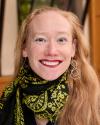The UW Percussion Ensemble (Bonnie Whiting, director) presents a year-end performance shared with the UW Steel Drum Band (Shannon Dudley, director) and the UW Gamelan Ensemble (Christina Sunardi, director).
UW PERCUSSION ENSEMBLE
Bonnie Whiting, director
Third Construction (1941) .................................................................................... John Cage (1912-1992)
The Unfinished Story of La Isla (2019) ............................ Lynn Park (b. 1998) & David Norgaard (b. 1998)
The Glass Abattoir (2008) ................................................................................ Philip Schuessler (b. 1976)
You Said (2019) ......................................................................................................... Aidan Gold (b. 1997)
Aidan Gold, speaking percussionist
Intentions (1983) ........................................................................................... Eugene Novotney (b. 1960)
I. Assumption
III. Function
II. Proposal
Sideways (2016) ..........................................................................................................Cara Haxo (b. 1991)
Three Ragtime Pieces (1924) ................................. George Hamilton Green (1893-1970), arr. Bob Becker
Log Cabin Blues [Calib Byers, xylophone]
Chromatic Foxtrot [Lynn Park, xylophone]
The Whistler [David Gaskey, xylophone]
UW Percussion Ensemble
Calib Byers
Edward Cunneen
David Gaskey
Aidan Gold
Cyrus Graham
Courtney James
Mason Lynass
Rhane Mallory
David Norgaard
Lynn Park
Sophia Schmidt
UW GAMELAN ENSEMBLE
Heri Purwanto, Visiting Artist in Ethnomusicology
with Jesse Snyder, Stephanie Shadbolt, Christina Sunardi, and UW Students
Gamelan are ensembles largely composed of gongs and keyed percussion instruments. Although many such ensembles are found throughout Southeast Asia, gamelan are primarily associated with musical cultures on the Indonesian islands of Java, Madura, Bali, and Lombok. In Java, the most preferred material is bronze, but iron and brass are also used as less expensive alternatives. Tonight’s set features gamelan music from central Java.
Although different gamelan may vary slightly in their tunings, most gamelan music in central Java uses a five-tone tuning system called sléndro or a seven-tone tuning system called pélog. There are a number of modes, or pathet, in each tuning system. The tuning system (laras) and mode (pathet) are specified in the title of each composition below. Tonight’s set features compositions in pélog using the instruments of the UW School of Music’s bronze gamelan, which is named Hapsari Kusumajaya (Heavenly Nymph Flower Power). Most gamelan include four groups of instruments. The large gongs of various sizes mark the musical structure of repeated gong cycles. The largest hanging gongs (gong) mark the very end of each cycle while the smaller hanging gongs (kempul) and horizontal gongs (kenong, kethuk, and kempyang) divide the cycle into phrases. A family of one-octave metallophones (saron, demung, and slenthem) plays a basic or skeletal version of the melody. A third group of instruments elaborates the melody and includes other metallophones (peking, gendèr, and gendèr panerus), the xylophone (gambang), gong-chimes (bonang and bonang panerus), flute (suling), bowed fiddle (rebab), and voice, although sometimes the saron, demung and slenthem elaborate the melody as well. Vocalists, in addition to elaborating the melody, may sing brief solos and are often a featured part of performances. Guiding the melodic elaboration is a conceptual melody that musicians know but that is not sounded by any one instrument. This melody, sometimes called the inner melody, is sounded when all of the instruments play together, and yet is not audible as a single line played on any one instrument. The drums (kendhang), the fourth group, control the tempo.
1. Ladrang Sapu Jagad, laras pélog pathet barang
This composition is often played at the beginning of gamelan performances and usually features what are referred to as the “loud” instruments—the one-octave metallophones, gong-chimes, gongs, and drums. Voice and the “soft” elaborating instruments such as the xylophone, multioctave metallophones, fiddle and flute are not used.
2. Ketawang Barikan, laras pélog pathet lima
A ketawang is a compositional form with sixteen beats per gong cycle. This ketawang and its lyrics can be understood as a prayer that asks for a peaceful life.
3. Ladrang Gajahmeta, laras pélog pathet nem
This piece is usually used in shadow puppet theater scenes that feature a strong male character.
4. Lancaran Dhangdut Aja Dipléroki, laras pélog pathet nem
This is a well-known and well-loved gamelan composition by the famous Javanese composer
Nartosabdo. The lyrics present a conversation in which a woman is reminded by her male partner
to remember her identity as a Javanese or Asian woman and not to be too Western in her ways or
manner of dress. Tonight the female and male vocal parts are sung by groups of female and male
singers.
~ Heri Purwanto and Christina Sunardi
UW GAMELAN MUSICIANS (students of Heri Purwanto):
Alicia Angto, Irita Aylward, Caty Barber, Sam Bramer, Javoen Byrd, Juliana Cantarelli Vita, Frederick Chandra, Katy Christensen, Daniel Finlay, Jack Flesher, Clairriss Johnson, Alya Khairuzzaman, Dzuhayra Mustaffa, Sahara Naini, Graham Peterson, Christina Sunardi, Lezhi Wang, James Wenlock
UW STEELBAND
Shannon Dudley, director & arranger
Show Yuh Emotion .................................................................................................. Andre Tanker
Old Lady Walk a Mile and a Half .................................................................................. Traditional
Air on the G String ......................................................................................................... J. S. Bach
Bonnie and Clyde ....................................................................... Destra Garcia, arr. Kristen Jones
Manicero ................................................................................................................ Moises Simón
Charlotte Street ......................................................................................................... Ray Holman
UW Steelband
Marley Bishop
Janella Kang
Jack Flesher
Kelsey Kua
Wyatt Gardner
Lucas Lindberg
Emily Iversen
T. J. Orgovan
Aidan Jackson
Colton Rothaus
Guest percussionists:
Marisol Berríos-Miranda
Monica Rojas
Miho Takekawa
Iris Viveros
Bonnie Whiting
Director Bio

Shannon Dudley, professor of Ethnomusicology, holds a PhD from the University of California at Berkeley. He teaches courses that include music of Latin America and the Caribbean, American popular music, Music and Community, Comparative Musicianship and Analysis, and graduate seminars in Ethnomusicology. He also directs the UW steeelband.
Dudley has conducted research in Trinidad and Tobago, focusing on the history and music of steelbands. More recent research interests include the musical geography of Santurce, Puerto Rico, as well as Latino contributions to American popular music. His theoretical interests include nationalism, transculturation, and participatory music practices.
His publications include Carnival Music in Trinidad (Oxford University Press, 2004), as well as Music From Behind the Bridge (Oxford University Press, 2008), a history of Trinidad steelband music, and numerous other articles on Caribbean music, including and "Judging by the Beat: Calypso vs. Soca," Ethnomusicology (1996), and “El Gran Combo, Cortijo, and the Musical Geography of Cangrejos/Santurce, Puerto Rico,” Journal of Caribbean Studies (2008).
Dudley is one of the curators (along with Marisol Berríos-Miranda, and Michelle Habell-Pallan) for American Sabor: Latinos in U.S. Popular Music, a bilingual museum exhibit that opened at the Experience Music Project in Seattle in 2008. Between 2008 and 2015 American Sabor was exhibited in 18 cities in the U.S. and Puerto Rico, first in its original version and later in a smaller version prepared in collaboration with the Smithsonian Institution Traveling Exhibit Service. Published as a book with University of Washington Press in 2018 (americansabor.music.washington.edu), American Sabor won the ARSC's 2019 prize for Best Historical Research in Recorded Rock and Popular Music.
In Seattle Dudley performs on steel pan with Dingolay, and participates in the Seattle Fandango Project (SFP), a community music group that practices son jarocho. He helps to run the Ethnomusicology division's Visiting Artist program, which includes Community Artists in Residence from Mexico, Puerto Rico, and elsewhere who participate in collaborations between local arts organizations and university programs.

Christina Sunardi is a professor in the Ethnomusicology program in the School of Music at the University of Washington, where she has been teaching since 2008. Her interests include performance, identity, spirituality and ethnography in Indonesia. Her work focuses in particular on the articulation of gender through music, dance, and theater in the cultural region of east Java. Since 2020 she has served as the Chair of the Department of Dance.
Her publications include articles in Bijdragen Tot de Taal-, Land en Volkenkunde, Asian Music, Asian Theatre Journal, and Ethnomusicology, as well as reviews in the Journal of Folklore Research Reviews, American Journal of Islamic Social Sciences, and Indonesia. Dr. Sunardi has been studying and performing Javanese arts since 1997 in Indonesia and the United States, earning her Ph.D. in music from the University of California, Berkeley in 2007. She has written two books about the negotiation of gender through performing arts in east Java, Stunning Males and Powerful Females: Gender and Tradition in East Javanese Dance (University of Illinois Press, 2015) and Fashioning Femininities, Making Masculinities: Gender, Performance and Lived Experience in Java, Indonesia (Lived Places Publishing, 2024).

Bonnie Whiting (she/her) performs, commissions, and composes new experimental music for percussion. She seeks out projects involving the speaking percussionist, non-traditional notation, improvisation, and interdisciplinary performance. Her debut album, featuring an original solo-simultaneous realization of John Cage's 45' for a speaker and 27'10.554” for a percussionist, was released by Mode Records in April 2017. Her sophomore album Perishable Structures, launched by New Focus Recordings in 2020, places the speaking percussionist in the context of storytelling and features her own music as well as works by Vinko Globokar, Frederic Rzewski, Richard Logan-Greene, and Susan Parenti.
Her recent season highlights include onstage work in the multimedia chamber opera The Ritual of Breath Is the Rite to Resist, featuring productions at Lincoln Center’s Summer for the City, at The Hopkins Center at Dartmouth College, and at Stanford Live; a reprise of composer Wang Lu’s Stages for solo speaking/singing percussionist at New York’s Performance Spaces for the 21st Century (PS21); and four performances of a new concerto written for her by Jonathan Bingham with the National Symphony Orchestra for the family pops series at the Kennedy Center alongside renowned children’s book author Mo Willems. Whiting also creates original, improvised music with clarinetist James Falzone and pianist Lisa Cay Miller; their first album was released on Allos Documents in 2024, and the trio performs this season in Seattle, Vancouver, and Portland.
In 2022 she premiered Through the Eyes(s): an extractable cycle of nine pieces for speaking/singing percussionist collaboratively developed with composer Eliza Brown and ten artists and writers incarcerated at the Indiana Women’s Prison. The project was featured on NPR’s nationally-syndicated Slingshot, and locally via Seattle’s ClassicalKING radio station. Whiting has an ongoing relationship as a soloist with the National Orchestra of Turkmenistan via the U.S. Embassy Cultural Affairs Office, playing concerti in Ashgabat in 2017 and 2018. She performs frequently with percussionist Jennifer Torrence, giving concerts of new experimental work for speaking percussionists throughout Norway and the US. Her collaboration with multimedia artist Afroditi Psarra generated the album <null_abc>, released on the Zero Moon label in 2018, and their project with designer Audrey Desjardins on transcoding data from IoT devices as performance received a 2019/20 Mellon Creative Fellowship. The project was explored in a workshop at the 2020 Transmediale Festival in Berlin, and currently lives as an interactive net art installation. She spent four years performing music for voice and percussion with the Harry Partch Ensemble on the composer’s original instrumentarium while the instruments were in residence at the UW. Whiting has presented solo and small ensemble shows at The Stone in New York, the Brackish Series in Brooklyn, The Lilypad in Boston, The New York City Electroacoustic Music Festival, at Hallwalls in Buffalo, the Tiny Park Gallery in Austin, The Wulf in LA, the Carl Solway Gallery in Cincinnati, The Grove Haus in Indianapolis, on the Wayward Music Series in Seattle, on tour throughout New Zealand, and at colleges and universities around the country.
Whiting is the Co-Artistic Director and core percussionist of the Seattle Modern Orchestra, the Pacific Northwest’s only large ensemble solely dedicated to music of the 20th and 21st Centuries, and she plays vibraphone with the Torch Quartet. As a chamber musician, she has collaborated with many of today's leading new music groups, including red fish blue fish percussion group, (George Crumb's Winds of Destiny directed by Peter Sellars and featuring soprano Dawn Upshaw for the Ojai Festival), eighth blackbird (the “Tune-in” festival at the Park Avenue Armory), the International Contemporary Ensemble (on-stage featured percussionist/mover in Andriessen's epic Die Materie at the Park Avenue Armory, and the American premiere of James Dillon's Nine Rivers at Miller Theatre), Talea Ensemble (Time of Music Festival in Finland), Bang on a Can (Steve Reich's Music for 18 Musicians for the LA Philharmonic's Green Umbrella Series) and Ensemble Dal Niente (the Fromm Concerts at Harvard.) She attended Oberlin Conservatory (BM), the University of Cincinnati College-Conservatory of Music (MM), and the University of California San Diego (DMA). She is an Associate Professor of Music at the University of Washington, where she has been Chair of Percussion Studies since 2016.
